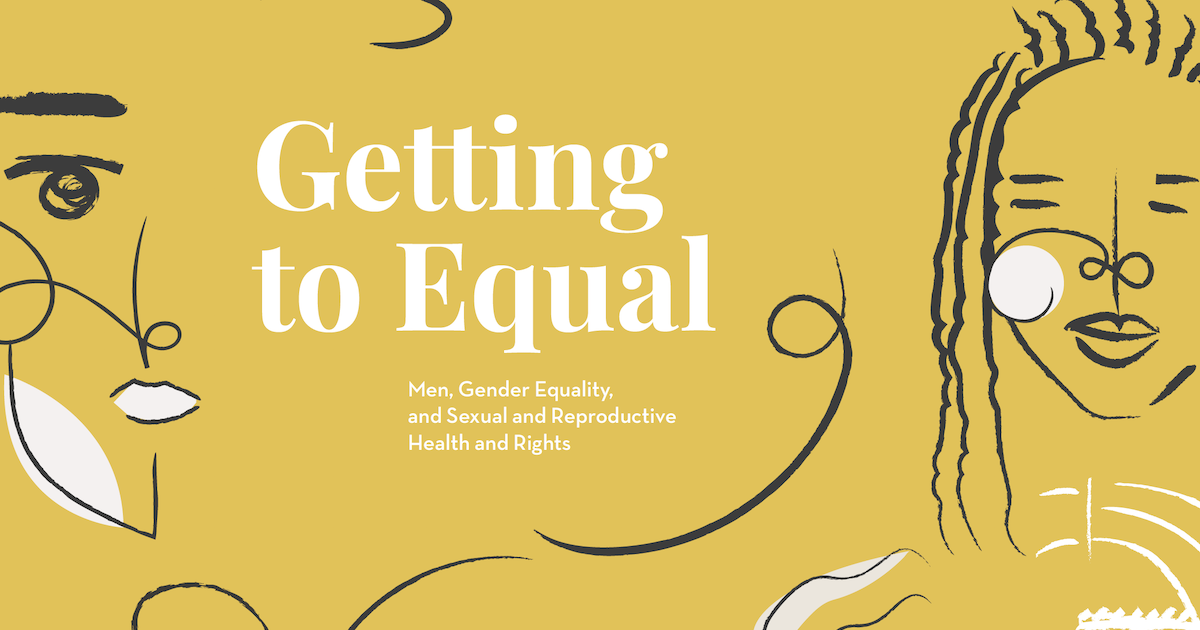
Imagine what people’s sexual and reproductive lives would look like if all of us enjoyed equal knowledge, skills, self-esteem, and access to services; conducted our relationships with respect for our partners and their rights; avoided or embraced parenthood with intention and planning; and made decisions that considered the impact of our choices throughout our lives and throughout the lives of our partners and children. Imagine if governments everywhere prohibited discrimination, proactively advanced human rights and gender equality, and ensured that everyone enjoyed their full right to health as enshrined in international laws and global and regional declarations.
This vision motivates Equimundo’s Getting to Equal initiative and this report. The report aims to shift the global discourse on men and sexual and reproductive health and rights (SRHR) among funders, researchers, policymakers, program implementers, and service providers toward a more holistic, gendered, and relational understanding of SRHR and toward the achievement of gender equality.
Through a review and analysis of the latest global evidence, this report offers up a new way to think about men and SRHR from two angles: First, it reinforces what we know already – that men’s partnership and active participation are crucial to achieving SRHR for everyone; and secondly it makes the case that SRHR is central to men’s own lives. Reimagining men’s roles in SRHR could contribute to the broader achievement of SRHR and other related health and development outcomes.
In particular, the report shows that:
- Research on men’s bodies reveals complexities related to pornography, gender norms, and sexual behavior: When it comes to learning about sex from a young age, pornography often exists as an inadequate and sometimes harmful substitute for comprehensive sexuality education; furthermore, prevailing harmful masculine norms can sometimes lead men to practicing risky sexual behavior, including low (or no) incidence of seeking sexual health services;
- Men’s relationships – their intimate partnerships, health, and rights – are shaped by societal norms and realities: The sexual double standard for men and women – whereby men are often given a social pass for having multiple partners, while women are not – significantly, and often negatively, affects relationship and power dynamics, including on issues such as relationship violence and/or controlling behaviors. This social dynamic can also impact age of marriage: In the past 15 years, men’s age at marriage has risen, and rates of marriage among men have declined in most places.
- Reproductive decision-making – including when it comes to contraceptive use, the degree to which pregnancies are wanted, and the impact of economic conditions on the decision to have a child – is linked to other relationship dynamics. The level of caring and communication, or coercion and intimate partner violence that exist within men’s relationships is associated with a couple’s decisions if to have children, and if so, how many, and at what time.
- Long-term data on men are critical to understanding their how their sexual and reproductive health and rights influence other aspects of their lives. This includes research on topics from the conditions of sexual initiation, to unintended pregnancies and childbearing histories, disease exposures and treatment, and more.
As a way forward, in the context of the centrality of men to sexual and reproductive health and rights for all, the report includes recommendations on the topics of:
- Advocacy, to change the culture and institutionalization of men’s disengagement with SRHR;
- Policies, to reframe the connections between men’s lives and SRHR – including a push toward and implementation of universal health coverage;
- Services, to identify and challenge harmful gender norms, and encourage and support men and boys to take greater responsibility for their own SRHR and work in partnership with women, girls, and individuals of all gender identities; and
- Research, to build the evidence on men’s relevance to SRHR.
The report emphasizes the central role of sexual and reproductive health and rights in the lives of men and demonstrates that they – and those around them – miss out when they are unable to manage their SRHR with information, skills, and respect. Men’s more informed, active, and caring roles as SRHR citizens could improve the health and lives of everyone.